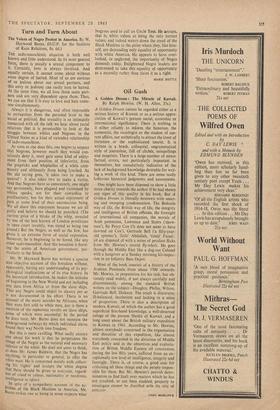Turn and Turn About
THE sado-masochistic situation is both well known and little understood. In its most general form, there is usually a sexual component to it. Certainly, love is always involved. And equally certain, it cannot come about without some degree of hatred. Most of us are envious of or jealous about our sexual partners, and this envy or jealousy can easily turn to hatred. At the same time, we all love those same part- ners and are very dependent upon them. Thus, we can see that it is easy to love and hate some- one simultaneously.
Always it is dangerous, and often impossible to extrapolate from the personal level to the social or political. But sexuality is so intimately connected.with all the talk we hear about racial relations that it is permissible to look at the struggle between whites and Negroes in the United States as a kind of extended relationship of sado-masochism.
As soon as one does this, one begins to suspect that Negroes, however much they would con- sciously deny it, must gain some kind of enjoy- ment from their position of inferiority, from the pinpricks and whiplashes of a white com- munity and ultimately from being lynched. As the old saying goes, 'it takes two to make a quarrel': it also takes two to make a victim. And that Negroes have so consistently, one might say persistently, been plagued and victimised by whites speaks, not for their cowardice or pusillanimity, but for their actual enjoyment of pain at some level of their unconscious being. We all share this enjoyment because we are all guilty and believe we should be punished. (The current price of a stroke of the whip, revealed by one of the best known of London prostitutes in open court recently, was stated as being one pound.) But the Negro, as well as the Jew, has given it an extreme form of social expression. However, he is beginning to be bored, like•any other sado-masochist. And this boredom is burst- ing the seams of American government, par- ticularly in the South.
Mr. W. Hayward Burns has written a c.,pncise and objective account of this boredom without, apparently, having any understanding of its psy- ch6logical implications or of its true history. In his historical introduction, he makes the mistake of beginning in the New World and not including any data from Africa or from the slave ships. That any Negro could object to slavery per se is not documented in his effort. There is no account of the many suicides by Africans, when they were first sold to white men, nor is there a mention of the numerous revolts on slave ships, some of which were successful. In the period he does treat, Mr. Burns does not mention the underground railways by which individual slaves found their way North into freedom.
But this is mere cavilling. What really annoys One about his work is that he perpetuates the image of the Negro as the natural and necessary inferior of the white. He does not seem to think, as does Mr. James Baldwin, that the Negro has anything, in particular or general, to offer the white man. He is concerned mainly with collect- ing his 'rights' and accepts the white dogma that these should be given to everyone, regard- less of creed or colour, nationality or neediness, intelligence or idiocy.
In spite of a sympathetic account of the ac- tivities of the Black Muslims in America, Mr. Burns strikes one as being in some respects what Negroes used to call an Uncle Tom. He accepts, that is, white values as being the only correct values, and indeed waters down the creed of the Black Muslims to the point where they, like him- self, are demanding only equality of opportunity with white America. He appears to have over- looked, or neglected, the importunity of Negro demands today. Enlightened Negro leaders are determined to take this equality of opportunity as a necessity rather than claim it as a right.
MARIE BATTLE






































 Previous page
Previous page